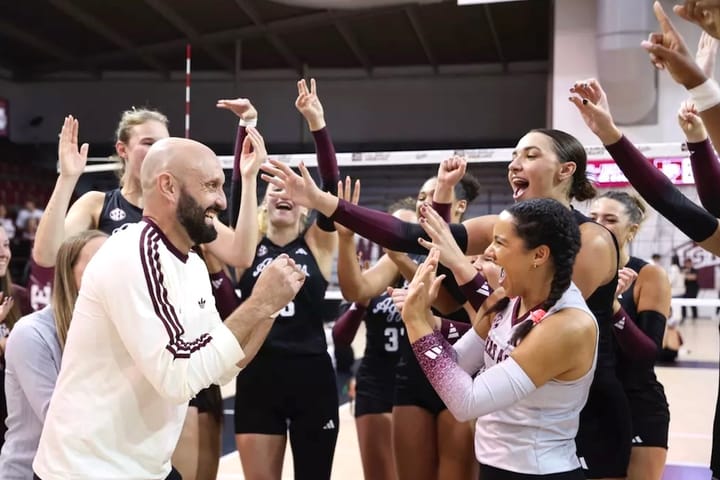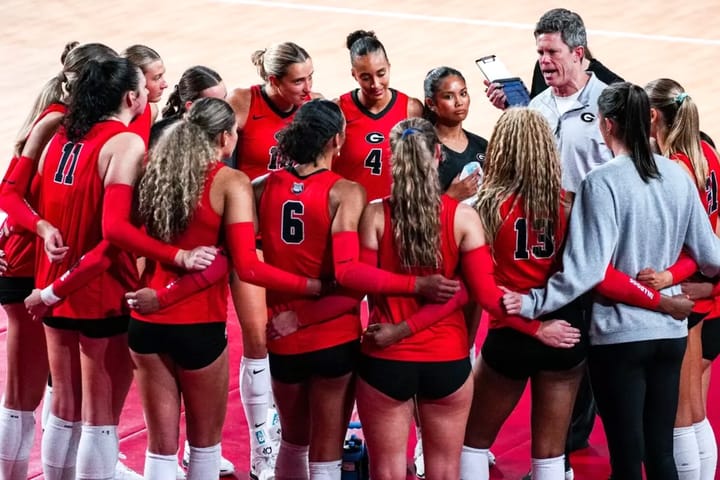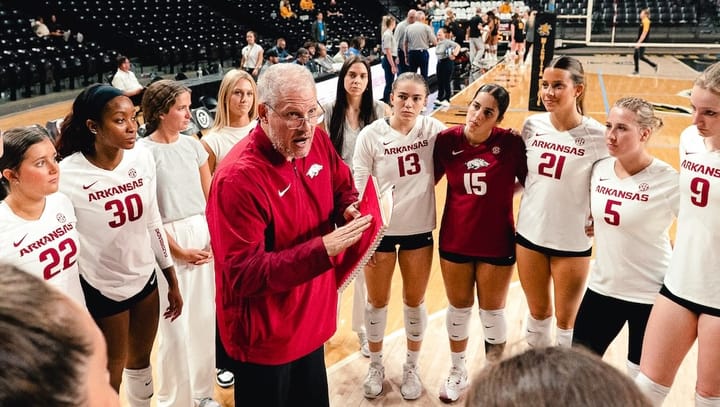100. Ray Bechard: Surround yourself with people who contribute more than they consume.
Ray Bechard led Kansas University volleyball for 27 transformative years. He established himself as a KU icon and one of college volleyball's most accomplished coaches.
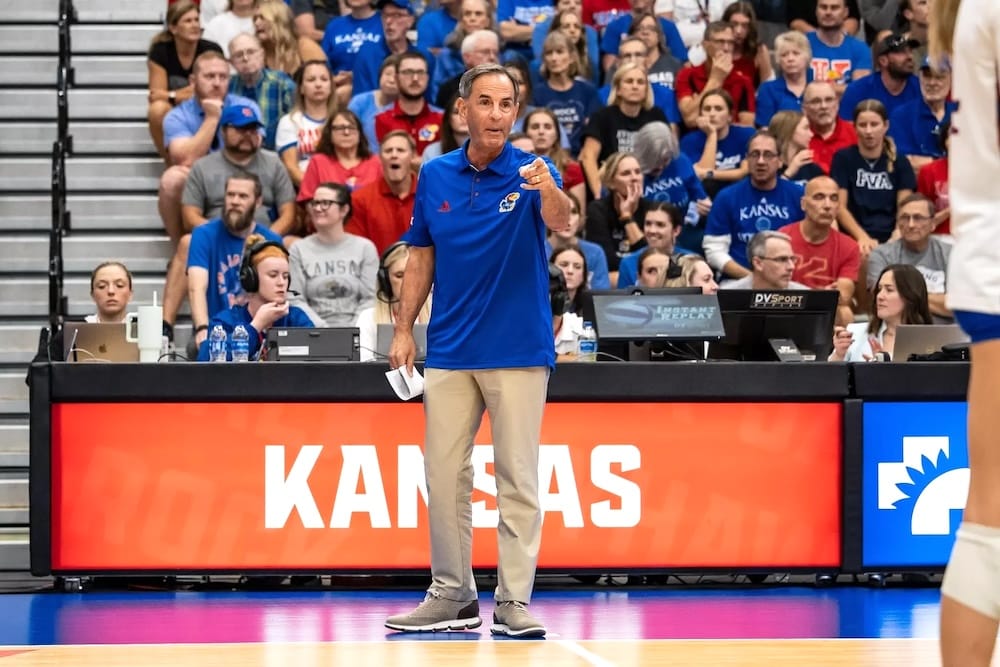
Having led the Jayhawks' program over an extraordinary 27-year tenure from 1998 to 2024, Ray Bechard stands as the most successful coach in Kansas volleyball history.
As a Kansas native coach Bechard led Kansas to 13 NCAA Tournament appearances, including a memorable Final Four run in 2015.
A five-time Big 12 Conference Coach of the Year, 'Coach B' developed 26 All-Americans and guided Kansas to seven top-25 finishes during his career. Before arriving at KU, coach Bechard coached at the junior college level for over 13 seasons at Barton County Community College.
His impact extends beyond wins and losses. Coach Bechard is recognized as a true architect of modern Kansas volleyball.
Bechard elevated Kansas volleyball from a program that had never reached the NCAA Tournament to a nationally competitive force.
Key takeaways from this article include:
- Embrace unexpected opportunities - Sometimes the best paths come from saying yes to things outside your comfort zone.
- Focus on process over results - Young coaches obsess over winning to build their resume. Instead, appreciate daily effort and improvement from players rather than rushing toward outcomes.
- Master the fundamentals - Passing and serving win games at every level. Basics matter more than complex tactics.
- Surround yourself with contributors, not consumers - Choose people who give energy and help others grow, not those who drain energy and only take from the team.
- Maintain unwavering standards - Team identity and expectations never stop, even outside practice. Standards must always be met, unlike goals, which can be adjusted.
- Consistency in leadership is crucial - Players need the same version of their coach every day. Trust builds slowly but disappears quickly with one inconsistent moment.
- Invest in meaningful relationships - The best investment is time with family and people who genuinely care about your well-being, not just your professional success.
In this open and insightful conversation, Coach Ray Bechard shares the experiences and ideas that have shaped his remarkable 45-year coaching journey.
Enter Ray...
Matias Raymaekers: Do you remember your thought process about what made you commit to becoming a head coach?
Ray Bechard: I grew up in a large family with six siblings, four of whom were brothers. So it was always competitive around the house, just with daily tasks or whatever we were doing. I played all sports growing up.
It was seasonal here in Kansas: football in the fall, basketball in the winter, track and field in the spring, baseball in the summer.
I'm from a very small town, and we'd go to an empty lot, pick up sides, and play. I was completely enamored with sports and competition. I had a decent high school career and got an offer to play community college basketball at Barton County Community College, which I was excited about.
I played for a coach named Lauren Miller. About halfway through my freshman season, I was pretty intrigued with how he went about his daily business as a coach.
There was one practice where I remember standing there watching as we ran through some offense, and it just hit me. I said, "Hey, this is exactly what I want to do. I want to coach basketball."
So I finished my two years at Barton County, completed my undergraduate degree at Fort Hays State University, and at age 21, I signed my first contract to be a high school basketball coach at a small rural high school in Western Kansas.
I was also going to teach driver's education, which is pretty exciting when you understand that kids in rural communities have already been driving for a couple of years by the time you get to them, and elementary PE.
I felt like I was in heaven, preparing for that opportunity. It was a very small high school, only a couple of hundred kids total.
But about a month and a half before I was supposed to start in August, I got a phone call from the superintendent, a gentleman named Terry Marshall. He said, "Ray, I need your help with something." I asked what he needed help with, and he said, "We're looking for a new volleyball coach at the high school."
I quickly replied, "I'm sorry, I can't help you. I have no interest, no background, no expertise." He said, "Well, I'd like you to think about it for a day or two." I said I would.
He called me back a couple of days later and said, "Ray, I'd like to congratulate you on being our new high school volleyball coach because we can't find anybody else." I said, "Terry, I'm not sure I can do the job." He said, "Yeah, just do the best you can for a year and then we'll figure it out."
So I had about a month to do a deep dive and call people. I was fortunate to have an older brother who was a high school volleyball coach, so I leaned on him a lot.
I built a relationship with Terry Pettit, who was the volleyball coach at the University of Nebraska and has done as much for volleyball in the Midwest as anybody.
Slowly but surely, I tried to build a little bit of a plan, and we made it through that first year. I'm not sure the team was very prepared or very organized, but we played hard and had fun.
What I learned is that volleyball was intriguing to me because there were so many people in such a small space, so many intricacies, so many movements, so many demands on communication, and so many teammates in a closed space. I got pretty enamored and excited about the possibilities of that.
After my first year of coaching volleyball and basketball, and teaching those farm kids how to drive, Terry, the superintendent, and principal Bill Stapleton asked, "Will you do it again?" I said yes.
I think I got a little bit better each year and became more adept at what I was trying to do. I still loved basketball dearly, but I began to develop a real passion for volleyball. That's how I got my coaching career off the ground.
The lesson there is: When an opportunity presents itself, at least give it a chance. Give it some thought, give it an opportunity, hear people out, because you never know where that might lead.
Matias Raymaekers: What advice would you give to that young Ray who was starting? If you could talk to him now, what would be the definite advice you'd give him?
Ray Bechard: Well, obviously, I was fortunate not to close the door when an opportunity presented itself, even though initially I didn't think it was the right thing.
After thinking about it and pondering on it and saying "why not?", I think it was an opportunity to stretch who I was and who I wanted to be. We all live in a comfort zone, but the more we can get outside that comfort zone, I think we have a chance of being the best version of ourselves.
I think the message to younger Coach Bechard – Coach Ray – would be that I wish I had been a little bit more in touch with the process instead of results.
As a young coach, sometimes you're trying to survive, you're trying to impress, you're trying to build your resume, you're trying to create opportunities for the future. But in fact, the opportunity that's right in front of you is the most important thing.
I know there were days at Lewis High School, or when I went on to Barton County Community College, or even at the University of Kansas, where there were student-athletes and people who were giving great effort.
I think I did appreciate it, but maybe I would have had greater appreciation now for people who are going through the process and how that works, and why that's so important.
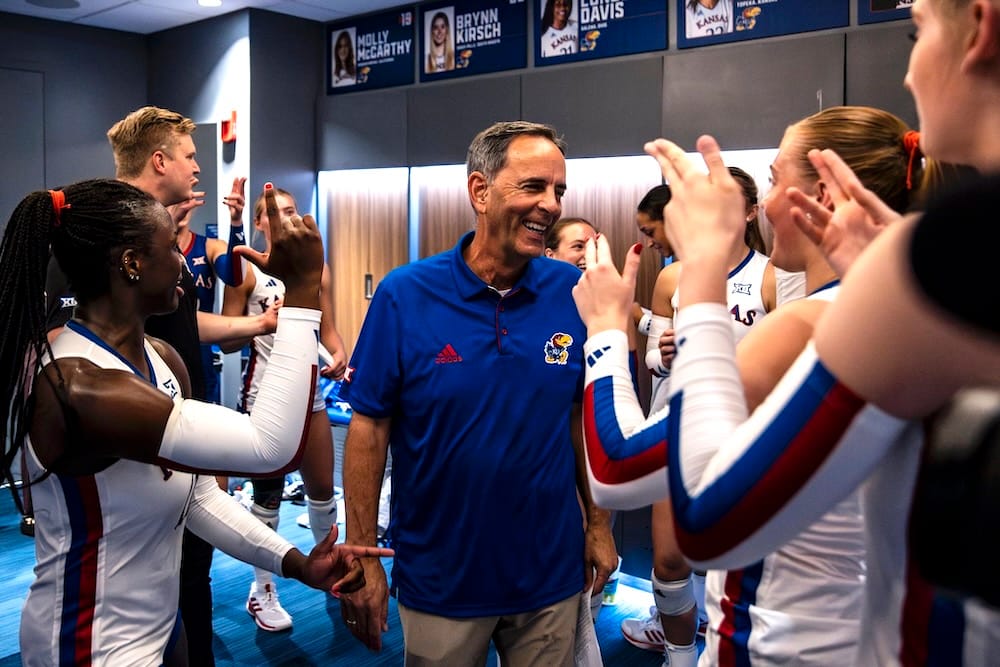
Yes, the winning and losing part is pretty mission-critical for keeping your job, but what kind of behaviors are those student-athletes exhibiting to try to get to that result? Are we locking into those? Are we appreciating those? Are we giving those the value that they deserve?
Because in the long run, it's those behaviors, it's those moments that'll get us to the result we want. But sometimes I think we're in such a hurry to get to the result and try to figure out what that's going to look like that maybe we lose a little bit of sight of what the process should look like – and appreciation for those moments when they happen.
Matias Raymaekers: The "bad recommendation question." What are the recommendations that you still hear coaches today give each other that keep on amazing you, like "Is this still around?
Ray Bechard: Well, from a technical side, it's two things: first contact, can you pass and serve? People ask me all the time, "What should we work on?" And it's so mundane, but the answer is always the same, regardless of the level of team I've coached.
We went to a Final Four in 2015, and you think about the team we were playing, the University of Nebraska, very physical, very dynamic, obviously very skilled. But in that match, they did two things a little better than we did: they passed and served a little bit better than we did. It seems very simplistic, but if I could rewind and go back, I'd spend more time on those two skills.
Now, when I coach my granddaughter's club team, which is coming up here shortly, we just can't overstate those two skills and how they lead to the outcome you want to achieve.
But beyond the technical side, somebody told me early in my coaching career:
"Surround yourself with people who contribute more than they consume."
I always thought that was one of the most valuable pieces of information I ever got from somebody. Forty-five years ago, that was true. And today it's still true.
I want to be around people who are willing to contribute, who are givers instead of those who feel like they consume or take out, the energy vampires or whatever you want to call them.
There hasn't been a day or two that's gone by where I haven't mentioned that to the teams I've coached: Are you contributing? Are you consuming?
Great organizations, great teams, they have a room full of people who are willing to contribute more than what they take out. We talk a lot about surrounding yourself with people who have EGB, energy-giving behaviors.
Anytime you walk into the room with these people, there's this energy, this enthusiasm, this optimism. I always get excited about people like that.
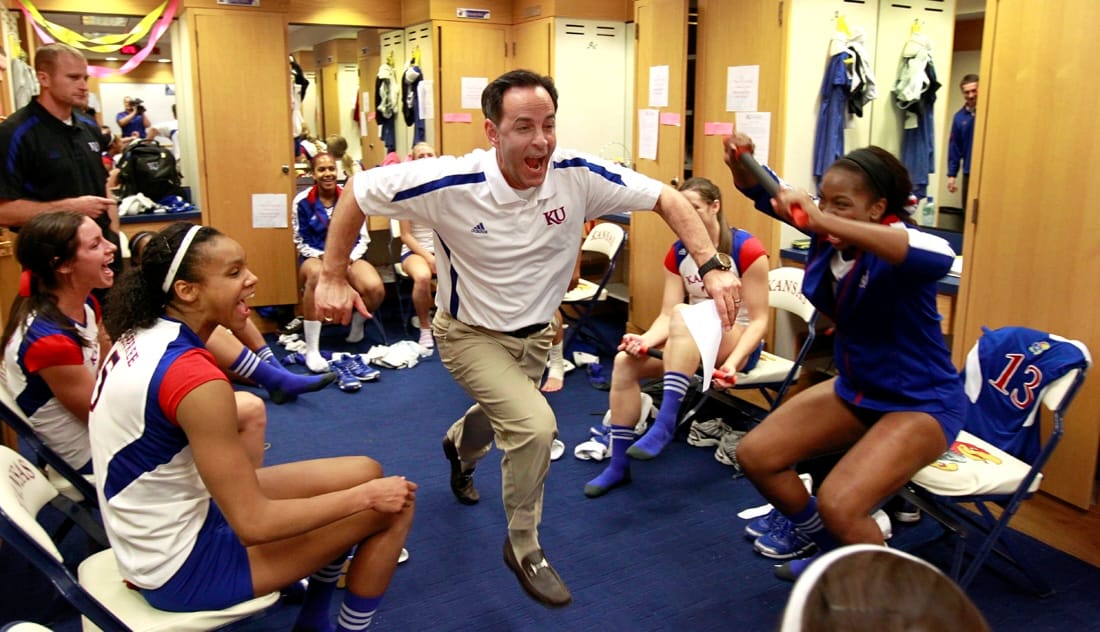
I think we need to look at. I always ask people, who are the four or five people in your inner circle? Who do you surround yourself with? Who do you rely on? Who's your board of directors?
Are they excited about you when you talk about your goals? Do they create optimism in your world? Are they excited about your path and where you're going? And do they make you better?
If you can't answer yes to all those questions, I'm not sure that inner circle is appropriate for you in that moment.
We talk to our team about this all the time: Who are you relying on for information? Who's in your inner circle, and how are they helping you be the best version of yourself?
Matias Raymaekers: Do you have a particular goal? Something that, when you wake up, gives you energy, or something bigger? It could also be something very objective. And the mistake I was going to make is thinking, "Well, you're a retired coach, maybe you don't have a goal anymore," but I can already see you smiling. So the question for you is: what is your goal today?
Ray Bechard: Today, I was excited about having a conversation with you! But people ask me, "How is retirement?" and I'm still sorting through what that's going to be like.
Every day for me now, I don't have the structure that I had in my prior situation, so I've got to be disciplined enough to create that structure for myself.
For the last 40 to 45 years, the months of August, September, October, November, and December, I was booked, I was busy, I was full speed ahead with my job. Now I'm excited about going to some football games. I've always wanted to go to Notre Dame and watch a football game. I don't know if you've seen the movie Rudy, but that's part of it.
